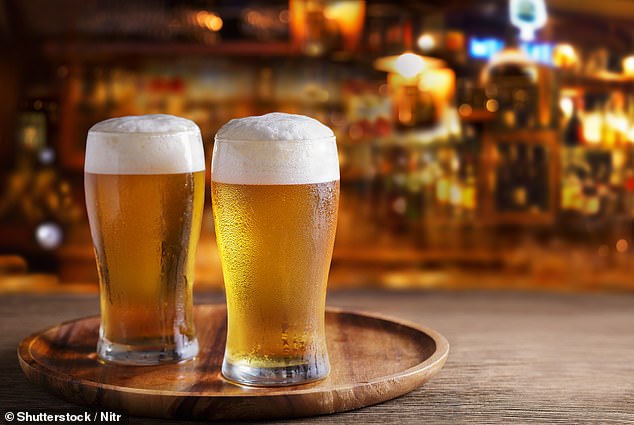A person’s IQ in high school has been linked to the amount of alcohol they consume later in life, according to a new study.
Researchers looked at the drinking habits of a random sample of 8,254 participants ages 53 to 65 and compared them to their IQs collected during their senior year of high school.
They found that for every one-point increase in IQ, the person was 1.6 percent more likely to consume moderate to heavy alcohol.
Moderate alcohol consumption was classified as consumption of one to 29 alcoholic drinks per month for women and one to 59 alcoholic drinks for men, and heavy alcohol consumption was classified as consumption of 30 or more alcoholic drinks per month. month for women and 60 alcoholic drinks or more for men.
Dr. E. Sherwood Brown, lead author of the study and professor of psychiatry at UT Southwestern, said, “We’re not saying that your IQ in high school controls your destiny.
“But IQ levels could lead to the intervention of social factors that influence alcohol consumption, and is an important mechanism to explore.”
“A higher IQ seemed to predict a greater likelihood of being a moderate or heavy drinker, but not a binge drinker.”
A study has revealed that there is a relationship between people who have a higher IQ in high school and consume more alcohol in the future
Alcohol consumption is increasing among people ages 50 and older in the U.S., with studies showing an increase in both overall alcohol consumption and binge drinking.
According to a Gallup poll Published in August, approximately 55 percent of adults age 55 and older consume moderate to large amounts of alcohol.
This statistic made Dr. Brown wonder if there was a link between people’s IQ levels and their drinking habits due to previous research connecting cognitive ability to future alcohol consumption.
“That led me to wonder: If alcohol influences cognition, could cognition affect alcohol consumption?” said.
To answer this question, researchers analyzed data from a Wisconsin longitudinal study that collected IQs and lifestyle information from more than 10,000 local high school seniors in 1957.
“The objective … was to evaluate the relationship between adolescent IQ and alcohol use in midlife and explore possible mediators of this relationship,” the report said. study saying.
The researchers compared this information to the survey of those students’ drinking habits later in life and found that those who had higher IQs were likely to consume more alcohol.

People with high IQs may be heavier drinkers because they have careers that require more social consumption.
While IQ was linked to heavy drinking, the study found that participants who had higher levels of intelligence had “significantly fewer episodes of binge drinking.”
The main difference between binge drinking and binge drinking is the frequency with which alcohol is consumed.
The National Institute on Alcohol Abuse and Alcoholism defines binge drinking as when men consume five or more drinks in a day or more than 15 in a week and four or more per day for women and at least eight per week.
Those who drink excessively consume five or more drinks in two hours for men and four or more in the same time period for women.
The researchers reported that their findings could be partially influenced by a person’s income level because those with a higher IQ are more likely to seek a stressful or high-paying job where social drinking is more common.
Dr. Jayme Palka, co-author of the study and assistant professor of psychiatry at UT Southwestern, said, “While it is not possible to capture all of the underlying mechanisms that mediate the relationship between alcohol consumption and IQ, we know that income explains partially the path between the two”. ‘
Statista reported that approximately 54 percent of adults ages 50 to 59 drink moderate levels, while between 6.4 percent and 7.8 percent reported heavy alcohol consumption.
Dr. Brown said he was inspired to conduct the study because of the link between excessive alcohol consumption and major health problems such as high blood pressure, cancer and stroke.
An estimated 474,000 cardiovascular deaths worldwide were attributed to alcohol consumption in 2019, according to the World Health Organization (WHO).
It has also been linked to worsening mental health conditions, including depression and anxiety.
“Alcohol is a carcinogen and contributes to about 50 different types of death,” said Dr. Timothy Naimi, director of the Canadian Institute for Substance Use Research at the University of Victoria. cnn.
Naimi, who was not involved in the study, continued: ‘In general, alcohol is a health hazard.
“The most consistent finding across all of science is that, generally speaking, the less you drink, the better your health.”


